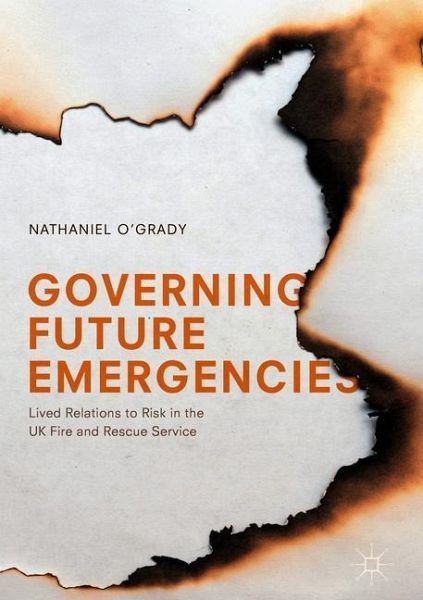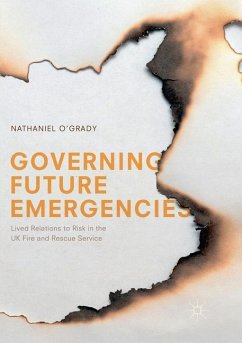
Governing Future Emergencies
Lived Relations to Risk in the UK Fire and Rescue Service
Versandkostenfrei!
Versandfertig in 6-10 Tagen
38,99 €
inkl. MwSt.
Weitere Ausgaben:

PAYBACK Punkte
19 °P sammeln!
The 21st century has born witness to myriad changes in the way the world is secured from the many emergencies that continually threaten to disrupt it. This book concentrates on two such changes. First, it takes stock of the ever-increasing development and diversification of data and digital technologies that security organisations have at their disposal. Secondly, it examines how these digital devices have fostered a new direction in which security agencies primarily conceive of emergencies as so many risks of the future. Emergency governance has undergone what might be called an anticipatory ...
The 21st century has born witness to myriad changes in the way the world is secured from the many emergencies that continually threaten to disrupt it. This book concentrates on two such changes. First, it takes stock of the ever-increasing development and diversification of data and digital technologies that security organisations have at their disposal. Secondly, it examines how these digital devices have fostered a new direction in which security agencies primarily conceive of emergencies as so many risks of the future. Emergency governance has undergone what might be called an anticipatory turn here, with digitally rendered and imagined scenes of future contingency becoming cause and justification for intervention in the here and now. Rather than scrutinising this turn at its most spectacular heights in the domains, for instance, of warfare or counter-terrorism, the book explores the facilitation of risk governance through digital technologies in a more quotidian incarnation; namely by tracing the steps that the United Kingdom's Fire and Rescue Service (FRS) take to govern fire emergencies whose potential has been identified but have yet to unfold. Delving into the FRS, the book maps out a digital infrastructure that includes various software, institutional processes, multiple forms of risk calculation but also human beings, relations and consciousness and an array of material spaces in which these things exist. Accentuated here is how these components assemble to produce projections of future emergencies on a number of sensorial registers. This infrastructure is shown, in turn, to inform and shape a catalogue of refined modes of action through which interventions on future emergencies are made in the present. Engaging in depth with this infrastructure, the FRS provides an understanding of risk as a lived relation, risk as an organisational ethos whose liveliness is founded upon and reverberates through the relations existing between those people and things operating in the FRS to make sense of potential fire emergencies. Using the concept of lived relation as a foundation, the book develops a critical understanding of anticipatory governance by grasping its resonance with issues emanating in the wider field of security, showing how security figures as a set of practices that rely upon and cultivates affective conditions, that enrols the force of elements like fire into its institutional arrangement, that draw on an array of knowledges to exercise power and, in the process, that instantiate new forms of subjectivity.














